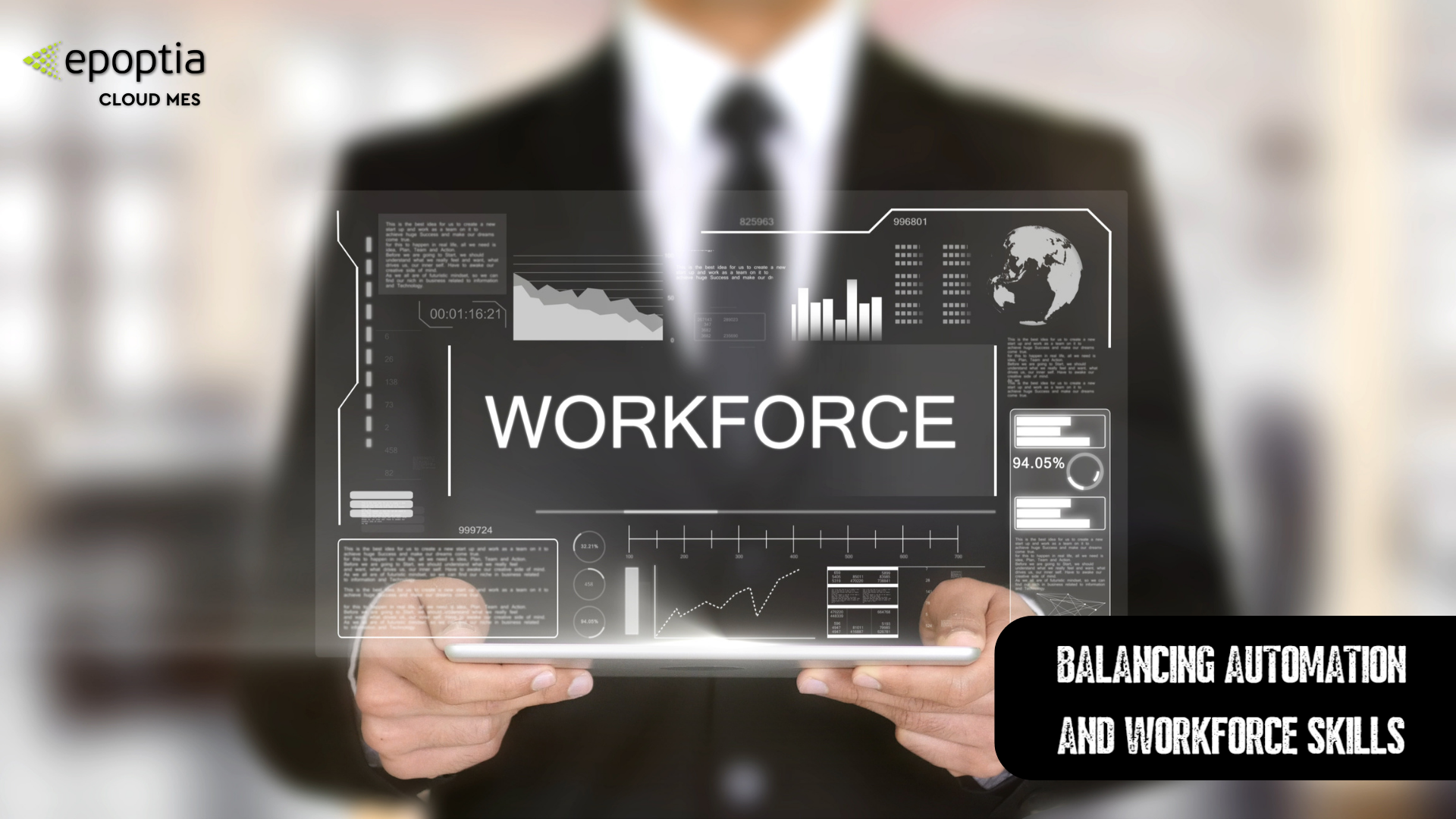Μάθετε πώς να βρείτε μια ισορροπία μεταξύ της αυτοματοποίησης και της αναβάθμισης των δεξιοτήτων του εργατικού σας δυναμικού για να παραμείνετε ανταγωνιστικοί
Το τοπίο της μεταποίησης υφίσταται μια μετασχηματιστική αλλαγή με την ενσωμάτωση των έξυπνων τεχνολογιών. Έτσι, καθώς πλοηγούμαστε σε αυτή την εποχή της καινοτομίας, η πρόκληση γίνεται εμφανής - πώς μπορούν οι επιχειρήσεις να επιτύχουν τη σωστή ισορροπία μεταξύ της αποτελεσματικότητας της αυτοματοποίησης και των αναντικατάστατων ιδιοτήτων του ανθρώπινου εργατικού δυναμικού; Σε αυτή τη διερεύνηση, εμβαθύνουμε στη σημασία του ανθρώπινου στοιχείου στην έξυπνη κατασκευή και συζητάμε στρατηγικές για την εναρμόνιση της αυτοματοποίησης με τις δεξιότητες και τη δημιουργικότητα των ανθρώπινων εργαζομένων.
Υιοθέτηση ανθρωποκεντρικών πρακτικών παραγωγής
Μέσα στον ανεμοστρόβιλο των ραγδαίων τεχνολογικών εξελίξεων που διαμορφώνουν το τοπίο της μεταποίησης, είναι απολύτως απαραίτητο οι ηγέτες του κλάδου να μη χάσουν από τα μάτια τους τη βαθιά εγγενή αξία που προσφέρουν οι ανθρώπινοι εργαζόμενοι στην παραγωγή. Η αναγνώριση αυτή υπερβαίνει την απλή αναγνώριση- υπογραμμίζει τη θεμελιώδη κατανόηση ότι η συγχώνευση των ανθρώπινων ικανοτήτων με την τεχνολογία αιχμής είναι ο καταλύτης για απαράμιλλη επιτυχία στη σύγχρονη μεταποίηση. Δηλαδή, οι διαφοροποιημένες ικανότητες των ανθρώπινων δημιουργικότητα, δεξιότητες επίλυσης προβλημάτων, και προσαρμοστικότητα γίνονται ανεκτίμητες, ιδίως σε σενάρια που απαιτούν σύνθετη λήψη αποφάσεων και διαισθητικές γνώσεις.
Αξιοποίηση των μοναδικών πλεονεκτημάτων: Σε αντίθεση με τις μηχανές, οι άνθρωποι φέρνουν συναισθηματική νοημοσύνη, διαίσθηση και ολιστική κατανόηση των συνθηκών στην παραγωγή. Η αξιοποίηση αυτών των μοναδικών πλεονεκτημάτων εξασφαλίζει μια πιο ολοκληρωμένη και διαφοροποιημένη προσέγγιση των προκλήσεων της παραγωγής.
Ενίσχυση της λήψης αποφάσεων: Η σύνθετη λήψη αποφάσεων, ιδίως σε σενάρια όπου οι παράγοντες είναι πολύπλευροι και εξαρτώμενοι από το πλαίσιο, είναι ένα πεδίο όπου οι ανθρώπινοι εργαζόμενοι διαπρέπουν. Η ικανότητα πλοήγησης στην ασάφεια και η λήψη τεκμηριωμένων αποφάσεων με βάση ένα μείγμα δεδομένων και διαίσθησης είναι το δυνατό σημείο της ανθρώπινης νοημοσύνης.
Προώθηση της καινοτομίας: Η σπίθα της καινοτομίας, η κινητήρια δύναμη πίσω από άλματα στο σχεδιασμό προϊόντων και τη βελτιστοποίηση διαδικασιών, συχνά προέρχεται από το μυαλό των ανθρώπινων δημιουργών. Μια ανθρωποκεντρική προσέγγιση προάγει μια κουλτούρα καινοτομίας, διευρύνοντας τα όρια του εφικτού.
Στην ουσία, η υιοθέτηση μιας ανθρωποκεντρικής προσέγγισης δεν είναι απλώς ένα νεύμα στις ρίζες της μεταποίησης, αλλά μια στρατηγική κίνηση για την ενίσχυση του κλάδου απέναντι στις προκλήσεις και τις ευκαιρίες του μέλλοντος.
Επίτευξη της σωστής ισορροπίας: Αυτοματοποίηση & εργατικό δυναμικό
Στην πορεία προς το μέλλον της μεταποίησης, η εξεύρεση της σωστής ισορροπίας μεταξύ της αυτοματοποίησης και των δεξιοτήτων του εργατικού δυναμικού αναδεικνύεται σε καθοριστική πρόκληση. Δεν είναι ζήτημα επιλογής μεταξύ των δύο- μάλλον, πρόκειται για την ενορχήστρωση μιας αρμονικής συμφωνίας όπου κάθε στοιχείο συμβάλλει στη συνολική αποτελεσματικότητα και καινοτομία της παραγωγικής διαδικασίας.
Αξιοποίηση της αυτοματοποίησης για επαναλαμβανόμενες εργασίες: Ο αυτοματισμός υπερέχει στη διεκπεραίωση επαναλαμβανόμενων και καθημερινών εργασιών, ένα πεδίο όπου η ακρίβεια και η συνέπεια είναι υψίστης σημασίας. Με την αυτοματοποίηση τέτοιων εργασιών, οι επιχειρήσεις μπορούν να απελευθερώσουν τους ανθρώπινους εργαζόμενους ώστε να επικεντρωθούν σε δραστηριότητες που απαιτούν δημιουργικότητα και κριτική σκέψη. Έτσι, αυτή η διπλή προσέγγιση όχι μόνο διασφαλίζει τη βέλτιστη αξιοποίηση των πόρων αλλά και μεγιστοποιεί την αποδοτικότητα τόσο των αυτοματοποιημένων συστημάτων όσο και των ανθρώπινων εργαζομένων.
Επένδυση στην κατάρτιση και την αναβάθμιση του εργατικού δυναμικού: Η επένδυση στη συνεχή κατάρτιση και επιμόρφωση του εργατικού δυναμικού αναδεικνύεται σε καίρια στρατηγική. Ενώ η αυτοματοποίηση μπορεί να αλλάξει τη φύση ορισμένων θέσεων εργασίας, ένα καλά καταρτισμένο εργατικό δυναμικό μπορεί να μεταβεί απρόσκοπτα σε ρόλους που συμπληρώνουν τα αυτοματοποιημένα συστήματα. Οι επιχειρήσεις πρέπει να υιοθετήσουν μια προληπτική προσέγγιση για την εκπαίδευση και την κατάρτιση, δίνοντας στο εργατικό δυναμικό τους τη δυνατότητα να προσαρμόζεται στα εξελισσόμενα τεχνολογικά τοπία.
Στρατηγικές για επιτυχή ενσωμάτωση
Καθώς τα κατασκευαστικά περιβάλλοντα αγκαλιάζουν τη μετασχηματιστική δύναμη της αυτοματοποίησης, η πλοήγηση στο τοπίο της ολοκλήρωσης καθίσταται υψίστης σημασίας. Όμως, πέρα από τις τεχνικές πτυχές, η επιτυχία της αυτοματοποίησης εξαρτάται από στρατηγικές προσεγγίσεις που καλλιεργούν τη συνεργασία μεταξύ των αυτοματοποιημένων συστημάτων και του ανθρώπινου εργατικού δυναμικού.
Δημιουργία κουλτούρας συνεχούς μάθησης: Στην εποχή της αυτοματοποίησης, όπου η μόνη σταθερά είναι η αλλαγή, η καλλιέργεια μιας κουλτούρας συνεχούς μάθησης αναδεικνύεται σε άξονα για την επιτυχή ολοκλήρωση. Πιο συγκεκριμένα, αυτό περιλαμβάνει τη δημιουργία πλατφορμών για τους εργαζόμενους ώστε να αποκτούν νέες δεξιότητες, να προσαρμόζονται στις τεχνολογικές αλλαγές και να συμβάλλουν ενεργά στις διαδικασίες καινοτομίας και βελτίωσης. Μια κουλτούρα μάθησης διασφαλίζει ότι το εργατικό δυναμικό παραμένει ευέλικτο και έτοιμο να αγκαλιάσει τις εξελισσόμενες τεχνολογίες.
Αντιμετώπιση των συλλήψεων του εργατικού δυναμικού: Η ενσωμάτωση της αυτοματοποίησης μπορεί να συναντήσει αντίσταση και ανησυχίες μεταξύ του εργατικού δυναμικού. Η ανοικτή επικοινωνία και οι διαφανείς συζητήσεις σχετικά με τα οφέλη της αυτοματοποίησης, το ρόλο της στη βελτίωση της ποιότητας της εργασίας και τις ευκαιρίες για αναβάθμιση των δεξιοτήτων μπορούν να αμβλύνουν αυτές τις ανησυχίες. Πιο συγκεκριμένα, μια συνεργατική προσέγγιση στη διαχείριση της αλλαγής διασφαλίζει ότι το εργατικό δυναμικό είναι ευθυγραμμισμένο με το όραμα της εταιρείας για το μέλλον.
Διασφάλιση της ηθικής εφαρμογής: Οι ηθικοί προβληματισμοί της αυτοματοποίησης δεν μπορούν να παραβλεφθούν. Δηλαδή, οι επιχειρήσεις πρέπει να αντιμετωπίσουν πιθανά ζητήματα όπως η εκτόπιση των θέσεων εργασίας και η απανθρωποποίηση της εργασίας. Θα πρέπει να υπάρχουν στρατηγικές που να διασφαλίζουν ότι η ενσωμάτωση της τεχνολογίας ευθυγραμμίζεται με τα ηθικά πρότυπα, προάγοντας ένα θετικό εργασιακό περιβάλλον και συμβάλλοντας στη συνολική ευημερία του εργατικού δυναμικού.
Αξιοποίηση των πλήρων δυνατοτήτων με το Epoptia MES
Γεννήθηκε μέσα στην παραγωγή, Το Epoptia κατανοεί τις ιδιαιτερότητες και τις προκλήσεις που αντιμετωπίζουν καθημερινά οι επιχειρήσεις. Η λύση μας MES δεν είναι απλώς ένα τεχνολογικό εργαλείο- είναι ένας συνεργάτης που μιλάει άπταιστα τη γλώσσα της παραγωγής. Δηλαδή, κατανοούμε την αξία της ανθρώπινης επαφής στις διαδικασίες παραγωγής και, για τον σκοπό αυτό, έχουμε διαμορφώσει το σύστημά μας έτσι ώστε να συμπληρώνει και να ενισχύει τις δεξιότητες του εργατικού σας δυναμικού. Παρέχοντας ένα ολοκληρωμένο MES, διασφαλίζουμε ότι η αυτοματοποίηση ενισχύει, όχι αντικαθιστά, τις ανθρώπινες δεξιότητες. Οι αναλύσεις σε πραγματικό χρόνο ενδυναμώνουν τη λήψη αποφάσεων και το σύστημα υποστηρίζει μια κουλτούρα συνεχούς βελτίωσης.
Συμπερασματικά, η εποχή της έξυπνης παραγωγής απαιτεί μια προσεκτική προσέγγιση για την εξισορρόπηση της αυτοματοποίησης και του ανθρώπινου εργατικού δυναμικού. Οι επιχειρήσεις που αναγνωρίζουν την αξία του ανθρώπινου παράγοντα, επενδύουν στην εκπαίδευση του εργατικού δυναμικού και εφαρμόζουν την αυτοματοποίηση με ηθικό τρόπο, είναι έτοιμες για βιώσιμη επιτυχία.
Αγκαλιάστε το μέλλον της παραγωγής με το Epoptia MES και ζητήστε μια παρουσίαση σήμερα.
Για περισσότερες πληροφορίες, δείτε https://bit.ly/3vYnb4f.




















